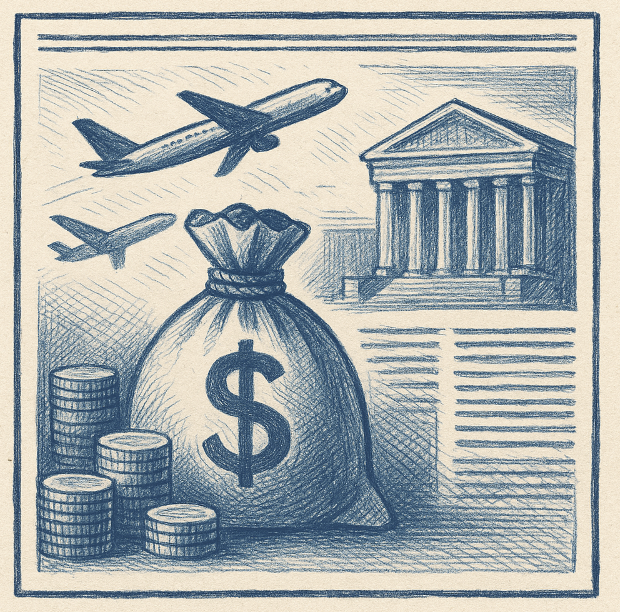| Not a fan of Fred? Unsubscribe here. |
U.S. Treasury Steps In With $20 Billion Lifeline for Argentina
America’s $20 Billion Peso Play
October 10, 2025
|
| MorningBullets is the fastest way to catch up on the market and political news that matter most to your money. Quick takes, sharp insight, and curated opportunities—served fresh every weekday morning. |
Sponsored Content
Five Ideas Under $20, Names, Tickers, RationaleOur free report spotlights five overlooked stocks with room to run. If you want asymmetric upside without big entry prices, start here. 📥 Download the Free ReportBy clicking any link you agree to receive emails from DailyMarketAlerts and our partners. You can opt out at any time. Privacy Policy |
 Global Finance in Motion: The U.S. Extends a Hand to Argentina
Global Finance in Motion: The U.S. Extends a Hand to Argentina
|
Good Morning, Markets are mixed this morning as Washington steps in with a $20 billion currency lifeline for Argentina, a move aimed at stabilizing the peso and calming emerging market jitters. We unpack what the Treasury’s intervention means for global liquidity, how it fits into broader U.S. financial strategy, and why it could matter for investors watching dollar strength and commodity swings.Markets rally as an Israel–Hamas ceasefire lowers oil prices and risk premiums (we will likely cover the implications of this next week as things flesh out.), AI adoption accelerates sharply across industries, California moves to stabilize its fire-hit insurance market, and Coinbase and Mastercard pursue a major stablecoin acquisition to expand crypto’s mainstream reach. Keep your feedback coming in, it let's me get to know you better. Here are your Morning Bullets. – Truly yours, Fred Frost |
📈 Yesterday's Market RecapMarkets showed mixed signals yesterday as silver spiked above $50 an ounce before retreating slightly, while gold dropped 2% as investors cashed in post-ceasefire news. Equities held steady with tech showing resilience, though energy lagged on geopolitical relief.
|
📉 Daily Performance Snapshot
|
🔭 What to Watch TodayToday's calendar holds critical events that could sway markets, from economic data releases to political developments with far-reaching financial impacts. Keep your eyes on these unfolding stories. |
💡 Opportunity WatchAmid market turbulence, a few themes stand out as potential winners for sharp-eyed investors. Here’s where to look.
|
Sponsored Content
27 Builders. One Date. Your Q4 Crypto Plan.Solana’s creator. Tether’s founder. THORChain’s architect. On Nov 11 they reveal the exact Q4 playbook: what to buy, when, and why.
List price By clicking the link above you agree to receive periodic updates from our sponsor. |
🔥 The Big BulletU.S. Treasury Launches $20 Billion Financial Rescue for ArgentinaWhat happened: The U.S. Treasury has finalized a $20 billion currency swap with Argentina’s central bank, marking the first major foreign intervention of the new U.S. administration’s economic policy. Treasury Secretary Scott Bessent confirmed the move, saying Washington agreed to buy Argentine pesos to stabilize Argentina’s collapsing currency and to bolster trade liquidity. Argentina’s economy has been strained by high inflation, capital flight, and a shrinking supply of foreign reserves. The peso’s collapse earlier this year prompted emergency measures by President Javier Milei’s government to attract investment and rebuild confidence. The Treasury’s intervention gives Argentina temporary breathing room but ties the funds to fiscal discipline and structural reform. Officials from both countries said the arrangement is expected to stabilize exchange rates and ease import bottlenecks over the next several months. Why it matters: This U.S. action signals growing concern over Latin America’s financial stability and the risk of contagion in emerging markets. A currency swap of this size means the United States is directly helping a foreign central bank shore up reserves—a rare and politically sensitive move. For investors, Argentina’s bond and equity markets could see short-term relief, but questions remain about its ability to maintain reforms without renewed inflation pressure. The Treasury’s decision also reflects Washington’s broader effort to counter Chinese financial influence in South America, where Beijing has offered similar bilateral loans. For global markets, this bailout comes amid renewed volatility in commodities and foreign exchange, heightening the appeal of safe-haven assets. The policy’s success could determine whether the U.S. extends similar programs to other distressed economies. Overall, this underscores how global macroeconomic risk remains tightly linked to U.S. fiscal diplomacy. What’s next: Markets will be watching how Argentina’s central bank manages the incoming liquidity and whether it uses the swap line to defend the peso or fund imports. Traders will also track upcoming data on Argentina’s inflation, which has hovered above 120%, to gauge if the intervention curbs domestic price growth. The next key moment will be when the Treasury releases its follow-up statement detailing repayment terms and the swap’s duration. Investors should monitor potential spillovers into sovereign bond spreads across Latin America. If the U.S. deems this pilot successful, more bilateral arrangements could follow for other fragile economies in the region. Meanwhile, Argentine policymakers are expected to outline structural reforms aimed at improving transparency and fiscal health in coming weeks.
|
Reader Feedback
Yesterday, the majority of you at 66% said "The government is spending too much."
Morgan from Florida told me yesterday: “I think prices stay high because big companies keep charging more, even when their costs go down. They want to make extra profit, and that makes it harder for everything to get cheaper again.”
Here's what I'm asking you today:
As always if your opinion is not here, or you want to throw your two cents at me, reply to the E-mail, and let me know your exact thoughts.
🧭 Policy & Market Ripples
|
|
Today's Trivia
Yesterday, 76% of you chose the right answer to the trivia question: To earn profit from lending money over time
|


